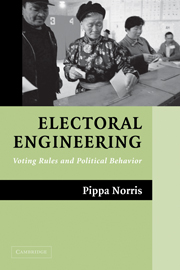Book contents
- Frontmatter
- Contents
- List of Tables and Figures
- Preface
- Electoral Engineering
- PART I INTRODUCTION
- PART II THE CONSEQUENCES FOR VOTING BEHAVIOR
- PART III THE CONSEQUENCES FOR POLITICAL REPRESENTATION
- 8 Women's Representation
- 9 Ethnic Minorities
- 10 Constituency Service
- PART IV CONCLUSIONS
- Bibliography
- Notes
- Index
10 - Constituency Service
Published online by Cambridge University Press: 05 September 2012
- Frontmatter
- Contents
- List of Tables and Figures
- Preface
- Electoral Engineering
- PART I INTRODUCTION
- PART II THE CONSEQUENCES FOR VOTING BEHAVIOR
- PART III THE CONSEQUENCES FOR POLITICAL REPRESENTATION
- 8 Women's Representation
- 9 Ethnic Minorities
- 10 Constituency Service
- PART IV CONCLUSIONS
- Bibliography
- Notes
- Index
Summary
The lesson from earlier chapters is that we can identify some of the probable “mechanical” results of electoral systems with a fair degree of confidence – such as their impact on the structure of party competition or the proportionality of votes to seats. But what are the psychological effects of electoral systems on the attitudes and behavior of politicians, and, thus, on broader issues of political representation and accountability in democratic societies? The incentives for legislators to develop a personal vote or incumbency advantage may be determined by many formal rules, including most important, (1) the ballot structure; (2) the centralization of the candidate selection processes within parties; (3) the size of multimember districts; and (4) the use of any term limitations on legislators. In this chapter I scrutinize some of the available evidence for these claims, focusing particularly upon the idea that candidate-ballots promote the individual accountability of elected members, by fostering stronger links between citizens and their parliamentary representatives than party-ballots. If true, we would expect that citizens voting via candidate-ballots should be more knowledgeable about parliamentary candidates, and should also have more contact with elected representatives, than those expressing their electoral choices through party-ballots.
What is the reasoning behind these claims? The ballot structure, determining how voters can express their choices, is assumed to be paramount in the chain of accountability linking representatives to the central party leadership and to local communities of citizens.
- Type
- Chapter
- Information
- Electoral EngineeringVoting Rules and Political Behavior, pp. 230 - 246Publisher: Cambridge University PressPrint publication year: 2004

